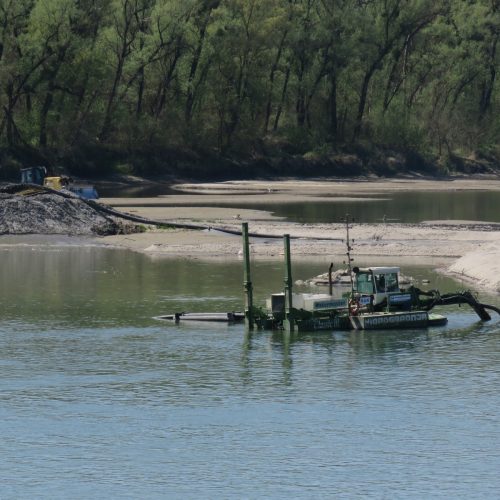News
Sand mining in the heart of the Amazon of Europe
Based on a flawed study, Croatian Ministry of Environment and Energy allowed the excavation of 460,000 m3 of sediment from the Drava River without an environmental impact assessment study or an appropriate assessment
Zagreb, Croatia – On March 26, 2020, the Ministry of Environment and Energy issued a permit to Croatian Waters for the excavation of 460,000 m3 of sediment from the Drava River near Osijek without an environmental impact assessment or an appropriate assessment study, citing the need to “reduce the risk of floods”.
Only a few days later, on March 30, Croatian Waters had chosen the contractor and secured all necessary permits in order to start operations even though the country had limited economic activities, except those supporting basic needs and protecting the health of its citizens due to the SARS-CoV-2 pandemic.
The Ministry completely ignored and rejected all issues that WWF and Green Osijek (a local NGO) raised concerning the environmental protection report used as the main argument for issuing the permit. Amongst other issues, the organizations stressed that the report had failed to justify the need for the removal of sediment, nor did it provide any relevant scientific data for the existence of excess sediment. In fact, existing dams on the Drava River in Austria, Slovenia, and Croatia stop more than 80% of sediment from reaching the downstream sections of the river flowing through Croatia and Hungary, resulting in severe river incision. As the river cuts deeper into its bed, the groundwater level drops, affecting local communities and surrounding nature alike - wells run dry, riparian forests lose access to water and begin dying, while agricultural lands degrade even further, their yields reduced.
Perfidiously, reducing the risk of floods was used as justification for sediment extraction, even though the data collected by the Croatian Meteorological and Hydrological Service clearly shows that the previous winter was unusually warm, with low precipitation, leading to a conclusion that this will be a dry year, without an increased risk of floods. Furthermore, recent official statements by regional authorities greeted the Ministry’s decision, saying that the sand and gravel from Drava will be used, amongst other things, for the construction of Corridor Vc (an extension of existing highway infrastructure), revealing the true intentions behind the mining operations.
“The Drava River, because of its outstanding natural features and values, is currently under several layers of protection. It is part of the Mura-Drava Regional Park, UNESCO’s Mura-Drava-Danube Transboundary Biosphere Reserve, and a NATURA 2000 site. Due to its status as a protected area, it is of paramount importance to determine the potential impact any intervention, such as sand mining, would have on target species, habitats, and conservation goals. Furthermore, Kopački Rit Nature Park, one of the most important wetlands in Europe, could be impacted by mining operations since it is a part of the Drava-Danube river system. Nevertheless, both the report and the Ministry’s decision failed to take all this information into consideration”, said Branka Španiček from WWF Adria.
The main purpose of environmental impact assessment procedures is to prevent interventions that have a significant impact on nature, thus stopping its uncontrolled destruction. They also contribute to a balanced economic development supporting nature conservation benefiting both people and nature. By completely ignoring procedures, the Ministry and Croatian Waters set a dangerous precedent that takes advantage of a legal loophole. It is certain that this decision will have long-lasting repercussions for all.
Paradoxically, Croatian Waters are the lead partner on the DRAVA LIFE project, worth 4.5 million euros, that is set to restore specific segments of the Drava River and reduce the impact of river regulation, hydroelectric dams, and sediment extraction. Planned mining operations are in the project area.
The extraction of huge amounts of sand and gravel from the river is in complete contradiction with the abovementioned project, co-funded by the EU and individual project partners, including Croatian Waters. Not only does mining endanger the completion and overall success of the DRAVA LIFE and other EU-funded projects centered on the river, but it will also degrade the fragile riverine ecosystem, the heart of the Amazon of Europe.
“The approved mining operations on the Drava River are contrary to three EU directives - Habitats Directive, Birds Directive, and Water Framework Directive. The European Commission has already issued official complaints to Croatia due to poor implementation of said directives. We expect an immediate halt to the mining activities and full compliance with EU directives to prevent any similar issues in the future”, Španiček concluded in a joint statement issued by WWF Adria, Green Osijek, and Croatian Society for Bird and Nature Protection
